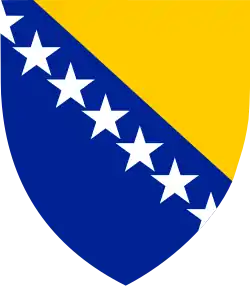Paddy Ashdown
Jeremy John Durham Ashdown, Baron Ashdown of Norton-sub-Hamdon, GCMG, CH, KBE, PC (27 February 1941 – 22 December 2018), known as Paddy Ashdown, was a British politician and diplomat who served as Leader of the Liberal Democrats from 1988 to 1999. He achieved international recognition for his role as High Representative for Bosnia and Herzegovina from 2002 to 2006, following his vigorous lobbying for military action against Yugoslavia in the 1990s.
The Lord Ashdown of Norton‑sub-Hamdon | |
|---|---|
_(cropped).jpg.webp) Ashdown in 2005 | |
| Leader of the Liberal Democrats | |
| In office 16 July 1988 – 9 August 1999 | |
| President | |
| Deputy | |
| Preceded by |
|
| Succeeded by | Charles Kennedy |
| High Representative for Bosnia and Herzegovina | |
| In office 27 May 2002 – 31 January 2006 | |
| Preceded by | Wolfgang Petritsch |
| Succeeded by | Christian Schwarz-Schilling |
| European Union Special Representative for Bosnia and Herzegovina | |
| In office 3 June 2002 – 31 January 2006 | |
| Preceded by | Office established |
| Succeeded by | Christian Schwarz-Schilling |
| Chair of the Liberal Democrat General Election Committee | |
| In office 26 September 2012 – 7 May 2015 | |
| Leader | Nick Clegg |
| Preceded by | Willie Rennie[nb] (2010) |
| Succeeded by | Greg Mulholland[nb] |
| Member of the House of Lords Lord Temporal | |
| In office 10 July 2001 – 22 December 2018 Life peerage | |
| Member of Parliament for Yeovil | |
| In office 9 June 1983 – 14 May 2001 | |
| Preceded by | John Peyton |
| Succeeded by | David Laws |
| Personal details | |
| Born | Jeremy John Durham Ashdown 27 February 1941 New Delhi, British India |
| Died | 22 December 2018 (aged 77) Norton-sub-Hamdon, Somerset, England |
| Resting place | Church of St Mary the Virgin, Norton Sub Hamdon |
| Nationality | British |
| Political party | Liberal Democrats |
| Other political affiliations | |
| Spouse(s) | Jane Courtenay (m. 1962) |
| Children | 2 |
| Alma mater | Bedford School |
| Profession | Diplomacy |
| Military service | |
| Allegiance | |
| Branch/service | |
| Years of service | 1959–1972 |
| Rank | Captain |
| Unit | Special Boat Service |
| Battles/wars |
|
| n.b. ^ as Campaigns & Communications Chair | |
After serving as a Royal Marine and Special Boat Service officer and as an intelligence officer in the UK security services, Ashdown was elected Member of Parliament for Yeovil in 1983 before retiring in 2001.
Ashdown received national recognition for his services by appointment as Knight Grand Cross of the Order of St Michael and St George (GCMG) in the 2006 New Year Honours and Member of the Order of the Companions of Honour (CH) in the 2015 New Year Honours.[1][2] In 2017, Ashdown was appointed an Officier of the Légion d'Honneur by the French Government.[3]
A polyglot, Ashdown had an interpretership qualification in Mandarin and was fluent in several other languages.[4]
Early life
Ashdown was the eldest of seven children: he had four brothers and two sisters.[5] He was born in New Delhi, British India,[6] on 27 February 1941[7][8] to a family of soldiers and colonial administrators who spent their lives in India.[9] His father was a lapsed Catholic, and his mother a Protestant. His mother (née Hudson) was a nurse in the Queen Alexandra's Royal Army Nursing Corps.[10] Ashdown's father, John William Richard Durham Ashdown (1909–1980), was a British Indian Army officer serving in the 14th Punjab Regiment and the Royal Indian Army Service Corps, and in 1944 attained the rank of temporary lieutenant colonel.[11][lower-alpha 1]
Ashdown was largely brought up in Northern Ireland, where his father bought a farm in 1945[6] near Comber, County Down.[13] He was educated first at a local primary school, then as a weekly boarder at Garth House Preparatory School in Bangor[13] and from age 11 at Bedford School in England, where his accent earned him the nickname "Paddy".[13]
Royal Marines and Special Boat Section
After his father's business collapsed, Ashdown passed the naval scholarship examination to pay for his school fees,[14] but left before taking A-levels and joined the Royal Marines in 1959.[13] He served until 1972[6] and retired with the rank of captain. He served in Borneo during the Indonesia–Malaysia confrontation and the Persian Gulf,[5] before training as a Swimmer Canoeist in 1965, after which he joined the elite Special Boat Section (now named the Special Boat Service) and commanded a Section in the Far East.[6] He then went to Hong Kong in 1967 to undertake a full-time interpreter's course in Chinese,[14] and returned to the UK in 1970 when he was given command of a Royal Marine company in Belfast.[6]
Intelligence officer and diplomat
Ashdown left the Royal Marines to join the Secret Intelligence Service (SIS or MI6).[14][15] As diplomatic cover, he worked for the Foreign and Commonwealth Office as first secretary to the United Kingdom mission to the United Nations in Geneva, Switzerland.[16] At the UN, Ashdown was responsible for relations with several UN organisations, involved in the negotiation of several international treaties, and some aspects of the Helsinki Accords in 1975.[17]
Political career
While in the Marines, Ashdown had been a supporter of the Labour Party but switched support to the Liberal Party in 1975. He had a comfortable life in Switzerland, where he lived with his wife Jane and their two children Simon and Katherine in a large house on the shores of Lake Geneva, enjoying plenty of time for sailing, skiing and climbing.[16] Ashdown decided to enter politics after the UK had two general elections in one year (those of February and October 1974) and the Three-Day Week.[14] He said that "most of my friends thought it was utterly bonkers" to leave the diplomatic service, but that he had "a sense of purpose".[18]
In 1976 Ashdown was selected as the Liberal Party's prospective parliamentary candidate in his wife's home constituency of Yeovil in Somerset,[16] and took a job with Normalair Garrett, then part of the Yeovil-based Westland Group. Yeovil's Liberal candidate had been placed second in the February 1974[19] and third in the October 1974 general elections;[20] Ashdown's objective was to "squeeze" the local Labour vote to enable him to defeat the Conservatives,[16] who had held the seat since its creation in 1918.[21] He subsequently worked for Tescan, and was unemployed for a time after that firm's closure in 1981, before becoming a youth worker with Dorset County Council's Youth Service, working on initiatives to help the young unemployed.[9][17] That position being an unpaid "volunteer" one, Ashdown himself being classified at the time as "long term unemployed", having applied unsuccessfully for 150 jobs.[22]
Member of Parliament
In the 1979 general election which returned the Conservatives to power, Ashdown regained second place, establishing a clear lead of 9% over the Labour candidate.[23] The Conservative majority of 11,382[23] was still large enough to be regarded as a safe seat when the sitting MP John Peyton stood down at the 1983 general election to be made a life peer. Ashdown had gained momentum after his years of local campaigning.[24] The Labour vote fell to only 5.5% and Ashdown won the seat with a majority of over 3,000,[25] a swing from the Conservatives of 11.9% against a national swing of 4% to the Conservatives.[26]
In Parliament
Ashdown had long been on his party's social democratic wing, supporting the 1977 Lib–Lab pact,[16] and the SDP–Liberal Alliance. In the early 1980s he was a prominent campaigner against the deployment in Europe of American nuclear-armed cruise missiles, describing them at a Campaign for Nuclear Disarmament rally in Hyde Park in 1983 as "the front end of the whole anti-nuclear struggle. It is the weapon we HAVE to stop."[27]
Shortly after entering the House of Commons, he was appointed SDP–Liberal Alliance spokesman on Trade and Industry and then on Education.[17] He opposed the privatisation of the Royal Ordnance Factories in 1984, criticised the Thatcher government in 1986 for allowing the United States to bomb Libya from UK bases, and campaigned against the loss of trade union rights by workers at GCHQ in 1987.[16]
Leader of Liberal Democrats
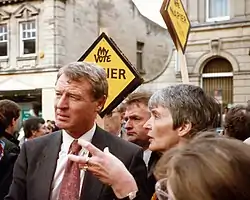
When the Liberal Party merged in 1988 with the Social Democrats to form the Social and Liberal Democrats (name shortened in 1989 to "Liberal Democrats"), he was elected as the new party's leader and made a Privy Councillor in January 1989.[28]
Ashdown led the Liberal Democrats into two general elections, in 1992 and 1997, and three European Parliament elections, in 1989, 1994 and 1999. The Lib Dems failed to win any seats in the 1989 European Parliament election and recorded a net loss of two seats in the 1992 general election, when the party was still recovering from the after-effects of the 1988 merger. In 1994, the party gained its first two Members of European Parliament.[29] At the 1997 election, the Liberal Democrats won 46 seats, their best performance since the 1920s, though they did take a smaller share of the vote than they had done at the 1992 election.[30] While the Liberal Democrats vote share decreased in the 1999 European Parliament election, the move from first-past-the-post to the D'Hondt method saw the party make a net gain of 8 seats.[31]
Between 1993 and 1997, he was a notable proponent of co-operation between the Liberal Democrats and "New Labour", and had regular secret meetings with Tony Blair to discuss the possibility of a coalition government. This was despite Labour's opinion poll showings from late 1992 onwards virtually all suggesting that they would gain a majority at the next election, particularly in the first year or so of Blair's leadership following his appointment in mid-1994. The discussions began in early 1993, while the party was still being led by Blair's predecessor John Smith, who died suddenly in May 1994. After Blair was elected as Labour leader the talks continued.[32]
There was no need for a coalition, as the 1997 general election ended in a Labour landslide victory. The election also saw a breakthrough for the Liberal Democrats despite receiving fewer votes than in 1992; they increased their representation from 18 to 46. A "Joint Cabinet Committee" (JCC) including senior Labour and Liberal Democrat politicians was then created to discuss the implementation of the two parties' shared priorities for constitutional reform; its remit was later expanded to include other issues on which Blair and Ashdown saw scope for co-operation between the two parties. Ashdown's successor as Liberal Democrat leader, Charles Kennedy, deliberately allowed the JCC to slip into abeyance until it effectively stopped meeting.[33]
Resignation and retirement
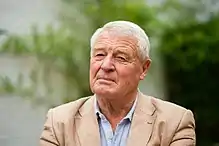
Ashdown announced his intention to resign as Leader of the Liberal Democrats on 20 January 1999,[34] departing on 9 August that year after 11 years in the role, and was succeeded by Charles Kennedy.[35] In mid-1999, there was speculation that he would be appointed the new Secretary General of NATO; his lack of governmental experience meant that doubts were raised about his suitability. The post was ultimately filled by Labour Defence Secretary George Robertson.[36][37][38]
He was appointed a Knight Commander of the Order of the British Empire (KBE) in 2000[39] and after retiring from the Commons one month previously, he was created a Life Peer, the peerage being gazetted on 16 July 2001 as that of as Baron Ashdown of Norton-sub-Hamdon, of Norton-sub-Hamdon in the County of Somerset.[40] In the 2001 election, the Yeovil seat was retained for the Liberal Democrats by David Laws. Likeise in 2001,the University of Bath conferred on Ashdown an honorary Doctor of Laws degree.[41]
In retirement Ashdown became a regular voice for the Liberal Democrats. He publicly supported military strikes in Syria in 2013, and said he was ashamed after parliament voted against them.[42] At the 2015 general election he appeared on the BBC soon after the announcement of the exit poll which predicted that the Liberal Democrats would be reduced from 57 MPs to 10. Ashdown stated that he would eat his hat if the exit poll was correct. The actual result was that the Liberal Democrats returned eight MPs but the technical difference from the exit poll was not enough to save him from several requests to carry out his vow. Some commentators suggested humorously that this was an example of Liberal Democrats breaking their promises in response to u-turns conducted while in coalition government.[43] The following day after the election, on the BBC's Question Time programme, Ashdown was presented with a chocolate hat that he later ate.[44]
Offer of Cabinet post
In June 2007, the BBC reported that Ashdown had been offered, and rejected, the Cabinet post of Northern Ireland Secretary by incoming Labour Party Prime Minister Gordon Brown. Liberal Democrat leader Sir Menzies Campbell had already ruled out the idea that members of his party would take seats in a Brown Cabinet, but, according to the reports, Brown still approached Ashdown with the offer.[45]
High Representative for Bosnia and Herzegovina
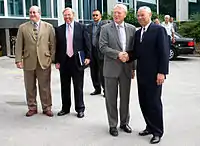

After leaving frontline British politics, he accepted the post of the High Representative for Bosnia and Herzegovina on 27 May 2002,[46] reflecting his long-time advocacy of international intervention in that region. He succeeded Wolfgang Petritsch in the position created under the Dayton Agreement. During his time as High Representative between 2002 and 2006,[47] he strengthened the central state institutions, brought in statewide legal bodies such as the State Investigation and Protection Agency and brought the two ethnic armies under a central civilian command, and moved Bosnia-Herzegovina toward EU integration.[47][48] He is sometimes denigrated as "the Viceroy of Bosnia" by critics of his work as High Representative.[49][50]
Witness for the prosecution at the Milošević trial
On 14 March 2002, Ashdown testified as a witness for the prosecution at the trial of Slobodan Milošević at the International Criminal Tribunal for the former Yugoslavia.[51] He said that he was on the Kosovo-Albania border near Junik in June 1998.[51] From this location through his binoculars, Ashdown claimed to have seen Serbian forces shelling several villages.[51]
In July 2005, a defence witness, General Božidar Delić, claimed by demonstrating with a topographical map of the area that Ashdown could not have been able to see the areas that he claimed to be able to see as hills, mountains and thick woods would have obstructed his view.[52]
After the Delić claims, Ashdown supplied the Tribunal with grid coordinates and a cross section of the ground indicating that he could indeed see the locations concerned.[53] These coordinates indicated he was on the Kosovo–Albania border, which was a sealed border at the time.[53] The prosecution also used some new maps and topographical cross sections indicating Ashdown's location, but their accuracy was challenged by Delić as the location of a village was different from other maps of the area.[53]
UN representative for Afghanistan
Ashdown was later asked by US Secretary of State Condoleezza Rice and UK Prime Minister Gordon Brown to take charge of the Allied effort in Afghanistan;[54][55] though an unnamed source is quoted in a 16 January Reuters report indicating that Ashdown was also approached by UN Secretary-General Ban Ki-moon and met with the Afghan President Hamid Karzai secretly in Kuwait to discuss the post which he later accepted.[56] He later decided against taking the role, after gleaning that Afghanistan preferred General Sir John McColl over him.[57] On 7 March 2008 Norwegian diplomat Kai Eide was appointed as the UN representative for Afghanistan, stating "I'm not Paddy Ashdown, but don't under-estimate me."[58]
Other positions
Ashdown was a member of the Governing Council of Interpeace, an international peacebuilding organisation,[59] and also served as President of Chatham House.[60] He later chaired the Liberal Democrats' 2015 general election team.[61]
In 2016, Ashdown founded More United alongside several other public figures in response to the result of the June referendum on British membership of the European Union.[62] More United is a liberal and progressive cross-party political movement.[63]
In popular culture
Ashdown was portrayed by Donald Sumpter in the 2015 Channel 4 television film Coalition.
Personal life
Ashdown married Jane Courtenay in 1962. The couple had a son, Simon, and daughter, Katharine, along with three grandchildren. In 1992, following the press becoming aware of a stolen document relating to a divorce case, he disclosed a five-month affair with his secretary, Patricia Howard, five years earlier from which he acquired the press nickname 'Paddy Pantsdown'.[64] His career and marriage both survived the political and tabloid storm, with his wife forgiving him.[16][65]
Ashdown supported Yeovil Town.[66] He was a member of the National Liberal Club.[67]
Illness and death
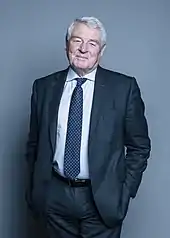
Ashdown was diagnosed with bladder cancer in October 2018.[68] He died on 22 December 2018 at the age of 77.[69] On 10 January 2019 a funeral service was held at St Mary's Church, Norton Sub Hamdon, in Somerset, and he was buried in the church's cemetery.[70] A Service of Thanksgiving was held for Ashdown at Westminster Abbey on 10 September 2019.[71]
Honours and awards
Honours
 Companion of the Order of the Companions of Honour (CH) (31 December 2014)[72]
Companion of the Order of the Companions of Honour (CH) (31 December 2014)[72] Knight Grand Cross of the Most Distinguished Order of St Michael and St George (GCMG) (31 December 2005)[73]
Knight Grand Cross of the Most Distinguished Order of St Michael and St George (GCMG) (31 December 2005)[73]_Ribbon.svg.png.webp) Knight Commander of the Most Excellent Order of the British Empire (KBE) (16 June 2000)[74][75]
Knight Commander of the Most Excellent Order of the British Empire (KBE) (16 June 2000)[74][75]
Appointments
- Life peer as Baron Ashdown of Norton-sub-Hamdon in the House of Lords (10 July 2001)[76]
Published works
- (2000). The Ashdown Diaries 1988–1997. 1. London: Penguin. ISBN 0-14-029775-8.
- (2002) [2001]. The Ashdown Diaries 1997–1999. 2. London: Penguin. ISBN 0-14-029776-6.
- (2008) [2007]. Swords and Ploughshares: Building Peace in the 21st Century. London: Weidenfeld & Nicolson. ISBN 978-0-297-85303-9.
- (2010) [2009]. A Fortunate Life: The Autobiography of Paddy Ashdown. London: Aurum. ISBN 978-1-84513-419-8.
- (2015) [2011]. The Cruel Victory: The French Resistance, D-Day and the Battle for the Vercors 1944. London: William Collins. ISBN 978-0007520817.
- (2012). A Brilliant Little Operation: The Cockleshell Heroes and the Most Courageous Raid of World War 2. London: Aurum. ISBN 978-1845137014.
- (2017) [2016]. Game of Spies – The Secret Agent, the Traitor and the Nazi. London: William Collins. ISBN 978-0-00-814084-7.
- (2018). Nein!: Standing Up to Hitler 1935–1944. London: William Collins. ISBN 978-0-00-825704-0.
See also
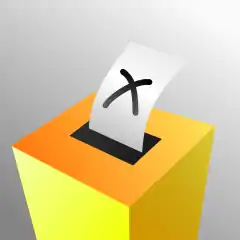 Politics portal
Politics portal United Kingdom portal
United Kingdom portal- Hong Kong Watch
Notes
- During 1940's retreat to Dunkirk, John Ashdown ignored an order to abandon the men of the 32nd Animal Transport Company (Mule) under his command, instead leading them to the port and on to one of the last ships to leave, without losing a single man. Although court-martialled for disobeying orders, he was exonerated, and by the war's end had risen to the rank of colonel.[12]
References
- "No. 61092". The London Gazette (Supplement). 31 December 2014. p. N28.
- "2015 New Year Honours List" (PDF). Retrieved 25 July 2016.
- "Parliamentary career for Lord Ashdown of Norton-sub-Hamdon - MPs and Lords - UK Parliament". members.parliament.uk.
- "Paddy Ashdown: 'Learning six languages has changed my life'". The Guardian. 14 October 2014.
I reply I have forgotten six … Malay … local language … among the Dayak people … two years learning Mandarin Chinese … [t]hen came German (briefly), French and Bosnian.
- "Five facts about Paddy Ashdown". Reuters. 21 June 2007. Retrieved 23 November 2007.
- "Curriculum Vitae: Paddy Ashdown". Office of the High Representative (OHR) and EU Special Representative (EUSR) in Bosnia and Herzegovina. 27 May 2002. Archived from the original on 10 November 2007. Retrieved 23 November 2007.
- Dennis Kavanagh (1998). "Ashdown, Paddy". A Dictionary of Political Biography. Oxford University Press. p. 20. Retrieved 31 August 2013. – via Questia (subscription required)
- "Birthdays", The Guardian, p. 33, 27 February 2014
- "Action man bows out". BBC News. 9 August 1999. Retrieved 23 November 2007.
- "Burke's Peerage – The Official Website". burkespeerage.com.
- "Officers of the Indian Army 1939–1945 – A". unithistories.com.
- Patrick Wintour, chief political correspondent (8 November 2000). "Ashdown tells how father stood by Indian troops". The Guardian. London. Retrieved 30 April 2010.
- Jonathan Sale (18 October 2001). "An education in the life of Lord Ashdown: 'I was bullied early on, but then I learnt to fight'". The Independent. London. Retrieved 23 November 2007.
- Hamilton, Fiona (12 April 2009). "Lover, commando, spy – the making of Paddy Ashdown". The Sunday Times. London. Retrieved 19 April 2009.
- Paul Waugh (4 May 2010). "Paddy Ashdown. Secret Agent". Evening Standard. Archived from the original on 7 May 2010. Retrieved 5 May 2010.
Paddy was so upset that he referred to his own spying days (in Geneva in the 1970s). He said of Dearlove: "I actually served in the Secret Intelligence Service with him
- Andrew Roth (19 March 2001). "Sir Paddy Ashdown". The Guardian. London. Retrieved 22 November 2007.
- "Who's Who: Lord Ashdown of Norton-sub-Hamdon GCMG KBE". Liberal Democrats website. Archived from the original on 18 October 2007. Retrieved 23 November 2007.
- John-Paul Flintoff (24 October 2003). "Bridge builder". Financial Times website. Retrieved 23 November 2007.
- "UK General Election results February 1974: Yeovil". Richard Kimber's political science resources. Retrieved 23 November 2007.
- "UK General Election results October 1974: Yeovil". Richard Kimber's political science resources. Retrieved 23 November 2007.
- Craig, F. W. S. (1983) [1969]. British parliamentary election results 1918–1949 (3rd ed.). Chichester: Parliamentary Research Services. ISBN 0-900178-06-X.
- Williams, Zoe (16 September 2016). "Paddy Ashdown: 'I turned to my wife and said, it's not our country any more'". The Guardian. ISSN 0261-3077. Retrieved 26 December 2018.
- "UK General Election results May 1979: Yeovil". Richard Kimber's political science resources. Retrieved 23 November 2007.
- Byron Criddle and Robert Waller (2002). Almanac of British Politics. Routledge. p. 841. ISBN 0-415-26833-8.
- "UK General Election results June 1983: Yeovil". Richard Kimber's political science resources. Retrieved 23 November 2007.
- "Lord Paddy Ashdown Politician and Elder Statesman". Champions plc. Retrieved 23 December 2018.
- Lewis, Julian (28 November 1996). "Nuclear record hard to defend". Western Gazette. Archived from the original on 9 October 2007. Retrieved 23 November 2007.
- "Privy Councillors". Leigh Rayment's Privy Councillors Pages. Retrieved 23 November 2007.
- "The European Elections in 1994 | UK Office of the European Parliament". Europarl.org.uk. Archived from the original on 20 November 2011. Retrieved 15 May 2015.
- "1997: Blair's landslide". BBC News.
- "Euro Elections, Results - Great Britain and Northern Ireland". BBC News. Retrieved 8 June 2019.
- "Breaking politics and political news for Westminster and the UK - PoliticsHome.com". epolitix.com.
- Grice, Andrew; Marie Woolf (22 September 2003). "Charles Kennedy: 'There's a change in the way politics is conducted. Outside Westminster, nobody talks of left and right'". The Independent. London. Retrieved 24 February 2011.
- "Ashdown to quit as leader". BBC News. 20 January 1999.
- "Kennedy to lead Lib Dems". BBC News. 9 August 1999.
- Fitchett, Joseph (15 July 1999). "Paddy Ashdown of Britain Is Seen by Some As Leading Candidate for Secretary-General : Hunt for NATO Chief Moves Into New Phase". The New York Times. The New York Times Company. Retrieved 18 April 2014.
- Ulbrich, Jeffrey (16 July 1999). "Secretary-general sought by NATO". Associated Press. Archived from the original on 19 April 2014. Retrieved 18 April 2014.
- Whitney, Craig R. (31 July 1999). "Britain Nominates Its Defense Secretary to Be Head of NATO". The New York Times. Retrieved 18 April 2014.
- "No. 55879". The London Gazette (Supplement). 19 June 2000. p. 7.
- "No. 56275". The London Gazette. 16 July 2011. p. 8373.
- "Honorary Graduates 2000 to 2009". University of Bath. Retrieved 23 December 2018.
- Carter, Claire (30 August 2013). "Syria crisis: Paddy Ashdown 'ashamed' of Britain over Commons vote". The Telegraph.
- "Video: Paddy Ashdown: I will 'eat my hat' if that poll is right". The Daily Telegraph. 8 May 2015. Retrieved 25 July 2016.
- Prince, Rosa (9 May 2015). "Lord Ashdown and Alastair Campbell forced to eat their (chocolate) hat and kilt". The Telegraph. Retrieved 16 May 2015.
- "Brown offered Ashdown Cabinet job". BBC News online. 21 June 2007. Retrieved 22 November 2007.
- Alex Todorovic (27 May 2002). "Ashdown takes over in Bosnia". The Daily Telegraph. London. Retrieved 23 November 2007.
- O'Reilly, Maria (1 December 2012). "Muscular Interventionism". International Feminist Journal of Politics. 14 (4): 529–548. doi:10.1080/14616742.2012.726096. ISSN 1461-6742. S2CID 146823558.
- "High Representative for Bosnia and Herzegovina Briefs Security Council, Noting Recent Transfer to Hague of Five Major War Crime Indictees". United Nations. Retrieved 21 March 2017.
- Mark Steyn (7 July 2002). "Message from America: we're independent". The Daily Telegraph. London. Retrieved 23 November 2007.
- Michael White (22 June 2007). "Team Gordon: Michael White suggests his dream team for a Brown cabinet". The Guardian. London. Retrieved 23 November 2007.
- "Milošević trial transcript 14 March 2002 Page 2331 Line 24". United Nations International Criminal Tribunal for the former Yugoslavia. 5 March 2007. Retrieved 24 February 2011.
- United Nations International Criminal Tribunal for the former Yugoslavia: Milošević trial transcript 7 July 2005 Page 42036 Line 7 & 12 July 2005 Page 42205 Line 1
- "Milošević trial transcript 28 September 2005 Page 44684 Line 1". United Nations International Criminal Tribunal for the former Yugoslavia. 5 March 2007. Retrieved 24 February 2011.
- Paul Reynolds (12 December 2007). "Dismantling the Taleban is the aim". BBC News. Retrieved 23 November 2007.
One "big idea being pressed by the British government is for the appointment of a senior international figure to be the UN representative for Afghanistan. The name of Lord (Paddy) Ashdown, who ran Bosnia-Herzegovina after the civil war, has been mentioned.
- Michael Abramowitz and Peter Baker (17 December 2007). "Bush Faces Pressure to Shift War Priorities: As Iraq Calms, Focus Turns to Afghanistan". Washington Post. Retrieved 23 November 2007.
Administration officials said the White House is considering a range of steps to stem the erosion, including the appointment of a leading international political figure to try to better coordinate efforts in Afghanistan. European newspapers have focused on Paddy Ashdown, a British politician and envoy, but a former senior military officer said his appointment would be considered controversial and seems unlikely.
- Michael Abramowitz and Peter Baker (16 January 2008). "Ashdown accepts job as U.N. Afghan envoy". Reuters. Retrieved 16 January 2008.
Paddy Ashdown has agreed to become the United Nations' envoy to Afghanistan, a source close to negotiations on the post said on Wednesday. "Yes, he has accepted the job," the source said of an agreement between Ashdown, 66, and U.N. Secretary-General Ban Ki-moon.
- "Ashdown pulls out of Afghan role". BBC News. 27 January 2008. Retrieved 30 April 2010.
- Leithead, Alastair (28 March 2008). "UN's new Afghan envoy begins work". BBC News. Retrieved 30 April 2010.
- Interpeace "Governing Council" Archived 1 April 2015 at the Wayback Machine Retrieved on 7 February 2012.
- Patrons, Presidents, Council and Directors – Chatham House Archived 11 September 2012 at the Wayback Machine Retrieved on 29 September 2012.
- "Paddy Ashdown to chair Lib Dem 2015 election team". BBC News. 26 September 2012. Retrieved 5 January 2015.
- Shead, Sam. "Paddy Ashdown has launched a tech-driven political startup called More United that will crowdfund MPs across all parties". Business Insider. Retrieved 18 November 2016.
- Shead, Sam (24 July 2016). "Paddy Ashdown has launched a tech-driven political startup called More United that will crowdfund MPs across all parties". Retrieved 23 December 2018.
- Boniface, Susie (21 October 2000). "Wife knew about 'Paddy Pantsdown' affair". The Guardian.
- Lucy Ward (21 January 1999). "End of the Ashdown era". The Guardian. London. Retrieved 22 November 2007.
- Cowlin, Chris (5 December 2007). Celebrities' Favourite Football Teams. Essex: Apex Publishing Ltd. p. 3. ISBN 978-1904444848.
- "National Liberal Club elects its first ever woman chairman". Liberal Democratic Voice. Archived from the original on 4 November 2016. Retrieved 18 November 2016.
- "Ex-Liberal Democrat leader Paddy Ashdown diagnosed with bladder cancer". Sky News. 2 November 2018.
- "Ex-Lib Dem leader Paddy Ashdown dies aged 77". BBC News. 22 December 2018. Retrieved 22 December 2018.
- 'Paddy Ashdown's funeral', B.B.C. News, 10 January 2019. https://www.bbc.co.uk/news/uk-england-somerset-46822389
- Davies, Caroline (10 September 2019). "'A man for ideals': former PMs pay tribute to Paddy Ashdown". The Guardian. ISSN 0261-3077. Retrieved 28 September 2019.
- "Ashdown recognised in honours list". BBC News. 30 December 2014. Retrieved 23 December 2018.
- "No. 57855". The London Gazette (Supplement). 31 December 2005. p. N3.
- http://www.libdems.org.uk (22 January 2014). "Paddy Ashdown". Liberal Democrats. Retrieved 23 December 2018.
- "The Queen's Birthday Honours". BBC. 16 June 2000.
- "Crown Office". London Gazette. 16 July 2001.
External links
| Wikimedia Commons has media related to Paddy Ashdown. |
| Wikiquote has quotations related to: Paddy Ashdown |
- Lord Ashdown of Norton-sub-Hamdon profile at the site of Liberal Democrats
- Profile at the Parliament of the United Kingdom
- Contributions in Parliament at Hansard 1803–2005
- Current session contributions in Parliament at Hansard
- Electoral history and profile at The Guardian
- Voting record at PublicWhip.org
- Record in Parliament at TheyWorkForYou.com
- Profile at Westminster Parliamentary Record
- Profile at BBC News Democracy Live
- Articles authored at Journalisted
- Column archive at The Guardian
- Appearances on C-SPAN
- Paddy Ashdown collected news and commentary at The Guardian

- Catalogue of the papers of Paddy Ashdown at London School of Economics Archives
- "After Iraq – Shall we ever intervene again?", lecture by Ashdown, given at Gresham College, 15 May 2007 (download as video or audio files)
- Audio: Lord Paddy Ashdown in conversation on the BBC World Service discussion show The Forum
- Paddy Ashdown at TED

- BBC Obituary
- Guardian: A political life in pictures
| Parliament of the United Kingdom | ||
|---|---|---|
| Preceded by John Peyton |
Member of Parliament for Yeovil 1983–2001 |
Succeeded by David Laws |
| Party political offices | ||
| Preceded by David Steel Robert Maclennan |
Leader of the Liberal Democrats 1988–1999 |
Succeeded by Charles Kennedy |
| Diplomatic posts | ||
| Preceded by Wolfgang Petritsch |
High Representative for Bosnia and Herzegovina 2002–2006 |
Succeeded by Christian Schwarz-Schilling |
| New office | European Union Special Representative for Bosnia and Herzegovina 2002–2006 | |

